- Home
- Alison McGhee
Firefly Hollow Page 2
Firefly Hollow Read online
Page 2
“Time for review,” said Teacher. “Name the three greatest threats to a cricket’s life.”
“Water,” said a little brown cricket.
“Correct,” said Teacher. “Water is to be feared.”
“All water?” said another cricket, an especially young one. “Even a teeny little bit of water?”
“All water,” said Teacher. “The river, the sea, even rain. Crickets have been known to drown in mud puddles. Even a heavy drenching is dangerous, because it can crush your carapace.”
The young crickets looked anxiously up at the sky. Rain, thought Cricket. Could rain really be that bad? It looked so pretty when it came pattering down onto the trail and the leaves and the grass.
“If ever you find yourself outside in the rain,” said Teacher, “what should you do?”
“Flee!” said a skinny, long-legged cricket. “Flee before a drop crushes your carapace!”
“Very good,” said Teacher. “Name another great threat to a cricket’s life.”
“Sun,” said a plump green cricket.
“Correct,” said Teacher. “An excess of sun is a terrible thing. Too wet, and a cricket can drown. Too dry, and a carapace can crack. If ever you find yourself outside in the hot sun, what should you do?”
“Flee!” said another cricket. “Flee before you dry up and die!”
“Very good,” said Teacher.
She reared back on her hind legs and waved an arm in the air to emphasize her point, which was that the world was a dangerous place. The rain, the sun, the water, the woods with its creatures of prey, just waiting for a tasty morsel of young cricket.
“But what, my little crickets, is the greatest threat of all?”
Teacher swept her gaze over the massed young crickets, waiting for them to give the answer, which everyone already knew:
“Giants.”
Cricket was the only one who stayed silent.
“Very good,” said Teacher, nodding. “Very good. And why are giants the greatest threat of all?”
She looked directly at Cricket, as if this question was meant for him alone.
“They don’t see us,” chanted the young crickets.
“And what else?”
“They don’t hear us.”
“And what else?”
“Stomp! Tromp! Aaargh!”
And the crowd of young crickets keeled over on their carapaces, all six legs waving feebly in the air, pretending to be in mortal pain from a giant’s misplaced footstep. Death by Giants was their favorite part of class.
Cricket looked at his classmates, writhing and wiggling on their backs. Laughing. Teacher leaped about grimly, a stern expression on her face.
“Stay far, far away,” she called, raising her voice above the fake groans and moans of her students. “Giants are the enemies of the cricket nation.”
Eventually the little crickets rolled one another back upright. They straightened up and quieted down and nodded: Stay far, far away from the giants. But Cricket gathered his courage and asked a question.
“Are all giants bad?” he said. “Aren’t there any good ones?”
The other young crickets raised their heads, astonished and annoyed. They gazed at him with dark, silent stares. Just when they were having so much fun playing Death by Giant, Cricket had to go and ask one of his questions. Why did he always have to do that? Of course all giants were bad! Of course there were no good giants! Didn’t he ever listen to Teacher? The little crickets rolled their eyes at one another.
Teacher sighed. She gave him a look that Cricket recognized. It was a look that told him to be quiet, to stop asking questions, to listen to her for once. Cricket knew that Teacher was sick of his constant questions, but he couldn’t help asking them. Now he waited patiently, hoping that she would answer.
“You’ve seen the giants, haven’t you, Cricket?” she finally said.
He nodded. Yes, he had seen the giants. Along with the other young crickets, the elders had taken him on a field trip to the edge of the woods, near the giants’ house. They had all perched by the marsh grass and observed them playing catch. The father giant and the mother giant were, admittedly, horrifying creatures, loud and clumsy, crashing about and shaking the earth.
But the miniature giant, the one they called Peter, didn’t seem so awful.
So what if he was huge? He wasn’t mean, as far as Cricket could tell. So what if he had missed when playing catch one day, so that his baseball came whipping over the heads of the crickets and they had all fled back to the safety of the school and vowed never to get that close to a giant again? At least Peter was trying to learn something new. He was practicing. Wasn’t that how you got better at something?
In Cricket’s opinion, it would only be a good thing if crickets knew how to catch falling objects. Then maybe they wouldn’t have to live in mortal fear of rain, let alone errant baseballs.
But truth be told, that one school field trip hadn’t been the only time Cricket had spied on the giants. In fact, Cricket had kept count of the number of times he had snuck back down to the sand while the others were asleep, to spy on Peter from the safety of the reeds, and the count was up to forty-seven.
Yes, forty-seven.
Forty-seven was a higher number than Cricket had ever heard any other cricket, including Teacher, count to. He was amazed that he could even count that high. But practice made perfect, didn’t it? And by now Cricket was well practiced in the arts of both spying and counting.
Back when the miniature giant’s friend was still around, Cricket would clap his wings together if one of them made a particularly good catch. He had memorized the song they used to sing together, a wonderful song about baseball and peanuts and never getting back. The lives of the miniature giants—their freedom, their laughter, their huge baseballs and even huger mitts—fascinated Cricket.
“You’ve seen the giants, Cricket,” Teacher was saying now. She stood above him, her wing waving back and forth like a metronome, all the students watching. “You know how terrifying they are. And you still have to ask if they’re all bad?”
She was fearsome, but Cricket didn’t back down.
“Peter doesn’t look so bad,” he said.
Teacher rose up in agitation.
“Don’t call him Peter,” she growled, waving her feelers and her front legs in his direction.
“But that’s his name.”
“He’s a miniature giant. And a miniature giant is nothing but a future giant.”
“Yeah!” said the other little crickets in unison, wanting to stay in Teacher’s good graces. “A miniature giant is nothing but a future giant!”
Teacher raised her wing, and the little crickets instantly quieted down.
“Tell me, Cricket,” she said. “Have you or have you not learned anything from Gloria? One lollipop stick flung carelessly from the hand of a miniature giant and now there she is—one front leg and one wing permanently damaged.”
Cricket nodded. He in fact wondered what she was doing at that very moment, as she couldn’t join them at the edge of the hollow.
“And have you or have you not been to the Museum of Giant Artifacts?” said Teacher.
“I have,” said Cricket.
“He has,” said the other crickets, trying again to impress Teacher.
All of them had been to the Museum of Giant Artifacts. The young crickets hated the museum, filled as it was with objects of doom, and they dreaded their enforced visits to it. All except Cricket, that is. Once again he plucked up his courage and faced Teacher.
“If crickets knew how to catch flying objects,” he said, “maybe someone could have caught that lollipop stick before it hurt Gloria.”
The other crickets gasped. Catch it? A lollipop stick? Cricket was crazy!
“Catching a flying object is far beyond the capabilities of any member of the cricket nation,” said Teacher. “Put that notion out of your head immediately.”
But Cricket didn’t.
&nbs
p; Instead he snuck off to the museum whenever he could and went straight to the baseball section. There was a card there that showed a smiling giant crouched in the dirt, a cage over his face and a baseball mitt held up in the air. This giant was named Yogi Berra. He was the greatest catcher of the major leagues, and there was no ball, no matter how fast, no matter how difficult to catch, that Yogi Berra couldn’t handle.
Cricket wanted to be the cricket version of Yogi Berra.
If I had caught that lollipop stick, he thought, Gloria wouldn’t have gotten hurt.
Why shouldn’t crickets learn how to catch flying objects? Wouldn’t that make them all safer? Telling Temperature. High Jumping. Fear of Giants. And Catch for Crickets.
But none of the other crickets felt the same way. And that was why, night after night, Cricket snuck away to the riverbank, to sing the baseball song alone.
CHAPTER THREE
THE LAST OF THE LEGENDARY RIVER VOLES
Vole also lived in Firefly Hollow.
All the small creatures of the land and the air knew him, or knew of him, but none knew him well. Unlike the fireflies and the crickets, Vole was a creature of the water. He lived on a boat by the riverbank, at the base of an old white birch not far from Firefly’s hollow tree. A clump of tiger lilies hid the boat in the warm months, and snow and ice kept it camouflaged in the winter.
You see, Vole was a river vole. River voles didn’t live in the meadows or underground in burrows like ordinary voles. River voles were brave and adventuresome creatures, who sailed the river their whole lives long.
But long ago, when Vole was still small, the giants who lived upstream had struck down a beaver dam. This caused the river to rise up in fury, swamping the fishing boats of the river voles and sweeping both boats and voles downriver, never to be seen again. All except one. Vole.
Vole was the last of his kind, the keeper of memories.
Many summers had passed since that tragedy, summers filled with the light and music of fireflies and crickets. Many winters had also passed, winters when the little creatures slept their long sleeps and Vole fished through a hole he bored in the ice.
Vole’s grandfather, a legendary river vole, had built the boat with his own paws. Curves of polished cedar ran the length and breadth of the old boat, and its mast was straight and true.
When he was young, Vole had watched his grandfather lean over the boat’s railing and gather the fishing net together, paw over paw, slowly hauling in the catch. All manner of fish came swimming up in his grandfather’s net, flopping and wriggling, a rainbow shimmer of scales, bright eyes casting about in fear, fins working wildly to find water that wasn’t there anymore.
Vole’s grandfather had begun teaching him the ancient lore of the river vole nation. He taught him to bow his head and put his paws together in honor of the fish who sustained them. He taught him to choose first one, then two, then another fish and place them in a wooden bucket filled with water. He showed Vole how to gather the net together again and fling it back over the side of the boat, letting the other fish go.
Once in the water, the fish shivered their fins and flicked their tails and were gone.
“Will we ever see them again, Grampa?”
“Maybe,” his grandfather had told him. “Maybe we’ll see them again when you learn to sail. Maybe we’ll catch a glimpse of them where the river meets the sea. You never know.”
Vole’s grandfather had been fearless. He had seen the great waters beyond, and he had stories to tell of it.
“Soon you’ll see it for yourself, Vole,” he had said. “You can’t imagine how beautiful it is.”
“When, Grampa? When?”
“When you’re ready, that’s when.”
“But when will that be?”
His grandfather had laughed.
“You’ll know when the time is right,” he said.
If his grandfather had lived, he would have taught Vole everything he needed to know in order to live the true life of a river vole. In fact, he’d already begun teaching Vole how to tie sailor knots. On that tragic day, his grandfather had just finished tying a series of knots for Vole, one after another on different lengths of rope. Then he had hung them on a row of hooks in the living room and begun with the very first knot.
“This is a bowline,” he had said, his paws nimbly threading one length of twine in and around another. “When in doubt, use a bowline. That’s my first sailing lesson to you, little Vole.”
Vole’s grandfather had been afraid of nothing except the giants. Rightly so, it turned out, because when the giants ripped out the beaver dam just a few hours later, Vole’s grandfather and all the other river voles who were out fishing had been lost to the wild water.
And ever since that day, Vole had been teaching himself how to sail.
He studied the River Vole’s Guide, in which famous sailors of the past had drawn navigational diagrams and constellations, the better to understand the movement of the river and the influence of the tides. He studied the knots his grandfather had tied, matching them to the knots in the River Vole’s Guide, undoing them and retying them. What would have taken only a few years, had the river vole nation survived, had taken Vole a lifetime.
But he was determined. The day would come when he untied the boat from its mooring and set sail. The day would come when he, Vole, would fulfill his river vole destiny. He tried not to think about the fact that he would be alone, with no one to witness his voyage and no one waiting for him with a celebration far downstream, where the river met the sea. That was just the way it was.
Now the sun went down, and the clearing in the woods began to glow with fireflies. Vole watched the little rebel cricket hop down the creature path and hide himself in the reeds by the riverbank. Every time Vole heard this particular cricket’s song, he crept out onto his deck to listen. There was something about the little cricket and his song that made him dream of faraway places. Of what he himself might see, when he finally sailed downstream and beheld the great waters beyond.
Vole sat down on his deck chair, picked up his twine, and practiced his clove hitch. This was a difficult knot, one that he still hadn’t quite mastered. Would he ever know everything he needed to know?
“You’ll know when the time is right,” he reminded himself, remembering his grandfather’s words. He sat on the deck and listened to the little cricket’s song.
“Take me out to the ball game
Take me out with the crowd.”
CHAPTER FOUR
IN SEARCH OF A CRICKET
The sky glowed with the light from a thousand stars. It was late, later than late, the time when young fireflies began to return to the hollow tree. All night long they twirled and spun in the blackness, and now they were tired. First one, then another, and then another slipped back through the knothole. They headed straight to the snail cupboard to eat their fill before they settled into their spiderweb hammocks to sleep.
Not Firefly. She hung back, hovering in midair, thinking about that one cricket out there, the one she had heard earlier that evening, singing the giant’s baseball song to himself. She wanted to find him.
First she doused her light, and then she waited until she saw the elders flit about on their good-night rounds. The hollow tree began to darken as the fireflies fell asleep one by one.
There, she thought, when the last of the lights went out.
She turned and gathered her strength. This would be the first time she had ever ventured completely out of the woods alone. She was brave, but still.
“Firefly?”
Oh no. She turned in midair and tilted her head, trying to see who had caught her. Fast fast fast, looooong looooong. Phew.
“Yes, Elder?”
“What are you up to, out here alone?”
She hovered before him, her light still doused, and said nothing.
“Firefly? I asked you a question.”
He floated back and forth, blinking in the slow, hypnotic pattern that the el
ders used to soothe the little fireflies to sleep. Despite herself, Firefly began to droop. She gave herself a shake to fight the tiredness.
“I’m going to look for a cricket,” she admitted.
“Whatever for?”
“I like the way he sings.”
“All crickets make music.”
“Not like this one, though.”
“How so?” said Elder, floating closer. “What makes this one different?”
“Well,” said Firefly, suddenly unsure of herself. After all, the little cricket’s song was a giant’s song, and Elder was afraid of giants just like every other firefly. Still, she floated over to him and whispered in his ear. “He sings a song about baseball.”
“Baseball? Baseball is a giant’s game.”
“I know,” said Firefly, “but it’s a really good song. And he’s a really good singer.”
Elder floated back and forth, still blinking in that hypnotic way. He hadn’t said no yet, though, so she gathered up her courage.
“I’m just going to stay out a little longer,” she said. “I won’t go far.”
She looked away from him so that she wouldn’t be lulled into sleepiness.
“And it’s so pretty out here,” she added. “The stars. The moon.”
She waited for him to start lecturing her, the way the other elders would have. After all, there were limits even to Elder’s considerable patience. She waited for him to tell her that even though he admired the stars and the moon just like her, it was dangerous to spend too much time thinking about them. She waited, but Elder was silent.
“I’m not sure I can make you do anything, Firefly,” he said.
“So I can go?”
“You can go, but before you do, look up at the sky with me for a minute.”
They flipped onto their backs, and Elder traced the outlines of the constellations with one wing.
“That’s the Milky Way,” he said, “and that’s Orion, and that’s the Big Dipper.”

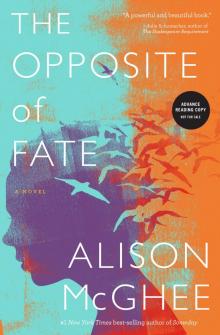 The Opposite of Fate (ARC)
The Opposite of Fate (ARC)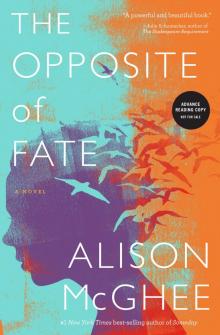 The Opposite of Fate
The Opposite of Fate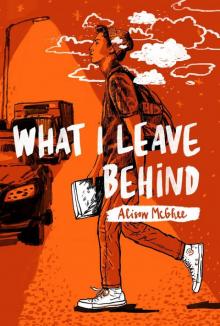 What I Leave Behind
What I Leave Behind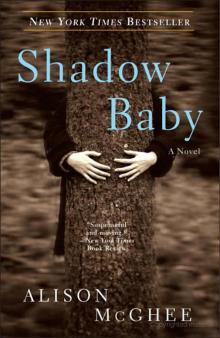 Shadow Baby
Shadow Baby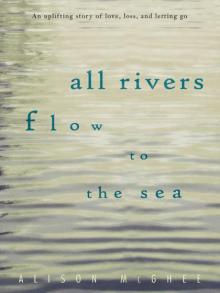 All Rivers Flow to the Sea
All Rivers Flow to the Sea Was It Beautiful?
Was It Beautiful?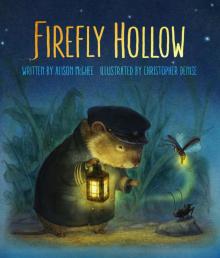 Firefly Hollow
Firefly Hollow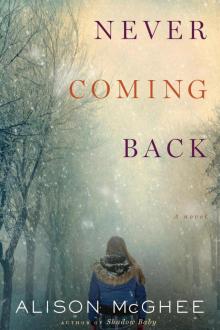 Never Coming Back
Never Coming Back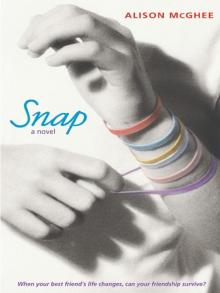 Snap
Snap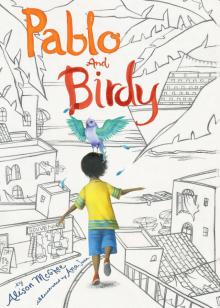 Pablo and Birdy
Pablo and Birdy